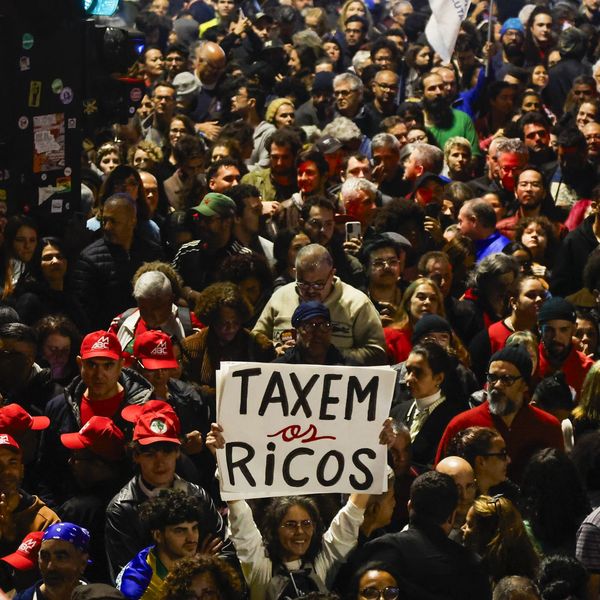
A recipient carries a box of food as others wait in line at a Food Bank distribution for those in need as the coronavirus pandemic continues on April 9, 2020 in Van Nuys, California. (Photo: Mario Tama/Getty Images)
'Poverty Is a Policy Choice': Studies Detail How Poorest Saved by Covid-19 Stimulus--and Why More Is Needed
"When you look at the size of the government response, it makes sense."
Two separate studies released Sunday show that U.S. government economic stimulus efforts aimed at offsetting the financial pain of the coronavirus pandemic lockdowns helped alleviate poverty in the country, sparking calls for further federal rescue programs to continue the relief.
"Poverty is a policy choice," tweeted progressive advocacy group People for Bernie.
\u201cPandemic was so dire it got the U.S. to finally provide ppl a real safety net (spending as exceptional bonuses what should be routine), & that made poverty *FALL* significantly in the country.\n\nA surprise in a sense. Also what many countries could predict.\nhttps://t.co/fLaCyjeGQO\u201d— Taniel (@Taniel) 1592794887
The studies--one from Columbia University researchers and the other from the University of Chicago and the University of Notre Dame--both specifically citing the one time $1,200 payments sent out to most Americans and the federally provided $600 weekly bonus to unemployment benefits for those out of work due to the pandemic.
While the two groups used different methodologies and had slightly different findings--the Columbia study found that poverty rose, but only slightly, while the Chicago group saw a reduction in poverty--the overall result that federal stimulus led to better outcomes for the country's poor was not in question.
As the New York Times reported:
The Columbia group's midrange forecast has poverty rising only slightly this year to 12.7%, from 12.5% before the coronavirus. Without the Coronavirus Aid, Relief and Economic Security Act--the March law that provided one-time checks to most Americans and weekly bonuses to the unemployed--it would have reached 16.3%, the researchers found. That would have pushed nearly 12 million more people into poverty.
"Right now, the safety net is doing what it's supposed to do for most families--helping them secure a minimally decent life," Columbia's Zachary Parolin told the Times. "Given the magnitude of the employment loss, this is really remarkable."
Meanwhile, the Times reported, University of Chicago and Notre Dame researchers "estimate that poverty in April and May fell to 8.6 percent for the previous 12 months, from 10.9 percent in January and February."
Notre Dame economics professor and study co-author James Sullivan said in an interview with the Times that the huge economic shock of the pandemic led researchers to expect a spike in poverty, not a reduction.
"When we initially saw our results, we thought, 'How could this be true?'" said Sullivan. "But when you look at the size of the government response, it makes sense."
With payments and bonuses set to expire at the end of July, Atlantic staff writer Annie Lowrey on Twitter opined that the results of the stimulus make a compelling argument for more aggressive and continued government programs to reduce poverty across the nation.
"If we can prevent recessions from increasing poverty by just giving people money, maybe we could end, say, deep poverty among kids by just... giving people money," Lowrey tweeted.
"Maybe just all poverty," she added. "Even during recessions."
An Urgent Message From Our Co-Founder
Dear Common Dreams reader, The U.S. is on a fast track to authoritarianism like nothing I've ever seen. Meanwhile, corporate news outlets are utterly capitulating to Trump, twisting their coverage to avoid drawing his ire while lining up to stuff cash in his pockets. That's why I believe that Common Dreams is doing the best and most consequential reporting that we've ever done. Our small but mighty team is a progressive reporting powerhouse, covering the news every day that the corporate media never will. Our mission has always been simple: To inform. To inspire. And to ignite change for the common good. Now here's the key piece that I want all our readers to understand: None of this would be possible without your financial support. That's not just some fundraising cliche. It's the absolute and literal truth. We don't accept corporate advertising and never will. We don't have a paywall because we don't think people should be blocked from critical news based on their ability to pay. Everything we do is funded by the donations of readers like you. Will you donate now to help power the nonprofit, independent reporting of Common Dreams? Thank you for being a vital member of our community. Together, we can keep independent journalism alive when it’s needed most. - Craig Brown, Co-founder |
Two separate studies released Sunday show that U.S. government economic stimulus efforts aimed at offsetting the financial pain of the coronavirus pandemic lockdowns helped alleviate poverty in the country, sparking calls for further federal rescue programs to continue the relief.
"Poverty is a policy choice," tweeted progressive advocacy group People for Bernie.
\u201cPandemic was so dire it got the U.S. to finally provide ppl a real safety net (spending as exceptional bonuses what should be routine), & that made poverty *FALL* significantly in the country.\n\nA surprise in a sense. Also what many countries could predict.\nhttps://t.co/fLaCyjeGQO\u201d— Taniel (@Taniel) 1592794887
The studies--one from Columbia University researchers and the other from the University of Chicago and the University of Notre Dame--both specifically citing the one time $1,200 payments sent out to most Americans and the federally provided $600 weekly bonus to unemployment benefits for those out of work due to the pandemic.
While the two groups used different methodologies and had slightly different findings--the Columbia study found that poverty rose, but only slightly, while the Chicago group saw a reduction in poverty--the overall result that federal stimulus led to better outcomes for the country's poor was not in question.
As the New York Times reported:
The Columbia group's midrange forecast has poverty rising only slightly this year to 12.7%, from 12.5% before the coronavirus. Without the Coronavirus Aid, Relief and Economic Security Act--the March law that provided one-time checks to most Americans and weekly bonuses to the unemployed--it would have reached 16.3%, the researchers found. That would have pushed nearly 12 million more people into poverty.
"Right now, the safety net is doing what it's supposed to do for most families--helping them secure a minimally decent life," Columbia's Zachary Parolin told the Times. "Given the magnitude of the employment loss, this is really remarkable."
Meanwhile, the Times reported, University of Chicago and Notre Dame researchers "estimate that poverty in April and May fell to 8.6 percent for the previous 12 months, from 10.9 percent in January and February."
Notre Dame economics professor and study co-author James Sullivan said in an interview with the Times that the huge economic shock of the pandemic led researchers to expect a spike in poverty, not a reduction.
"When we initially saw our results, we thought, 'How could this be true?'" said Sullivan. "But when you look at the size of the government response, it makes sense."
With payments and bonuses set to expire at the end of July, Atlantic staff writer Annie Lowrey on Twitter opined that the results of the stimulus make a compelling argument for more aggressive and continued government programs to reduce poverty across the nation.
"If we can prevent recessions from increasing poverty by just giving people money, maybe we could end, say, deep poverty among kids by just... giving people money," Lowrey tweeted.
"Maybe just all poverty," she added. "Even during recessions."
Two separate studies released Sunday show that U.S. government economic stimulus efforts aimed at offsetting the financial pain of the coronavirus pandemic lockdowns helped alleviate poverty in the country, sparking calls for further federal rescue programs to continue the relief.
"Poverty is a policy choice," tweeted progressive advocacy group People for Bernie.
\u201cPandemic was so dire it got the U.S. to finally provide ppl a real safety net (spending as exceptional bonuses what should be routine), & that made poverty *FALL* significantly in the country.\n\nA surprise in a sense. Also what many countries could predict.\nhttps://t.co/fLaCyjeGQO\u201d— Taniel (@Taniel) 1592794887
The studies--one from Columbia University researchers and the other from the University of Chicago and the University of Notre Dame--both specifically citing the one time $1,200 payments sent out to most Americans and the federally provided $600 weekly bonus to unemployment benefits for those out of work due to the pandemic.
While the two groups used different methodologies and had slightly different findings--the Columbia study found that poverty rose, but only slightly, while the Chicago group saw a reduction in poverty--the overall result that federal stimulus led to better outcomes for the country's poor was not in question.
As the New York Times reported:
The Columbia group's midrange forecast has poverty rising only slightly this year to 12.7%, from 12.5% before the coronavirus. Without the Coronavirus Aid, Relief and Economic Security Act--the March law that provided one-time checks to most Americans and weekly bonuses to the unemployed--it would have reached 16.3%, the researchers found. That would have pushed nearly 12 million more people into poverty.
"Right now, the safety net is doing what it's supposed to do for most families--helping them secure a minimally decent life," Columbia's Zachary Parolin told the Times. "Given the magnitude of the employment loss, this is really remarkable."
Meanwhile, the Times reported, University of Chicago and Notre Dame researchers "estimate that poverty in April and May fell to 8.6 percent for the previous 12 months, from 10.9 percent in January and February."
Notre Dame economics professor and study co-author James Sullivan said in an interview with the Times that the huge economic shock of the pandemic led researchers to expect a spike in poverty, not a reduction.
"When we initially saw our results, we thought, 'How could this be true?'" said Sullivan. "But when you look at the size of the government response, it makes sense."
With payments and bonuses set to expire at the end of July, Atlantic staff writer Annie Lowrey on Twitter opined that the results of the stimulus make a compelling argument for more aggressive and continued government programs to reduce poverty across the nation.
"If we can prevent recessions from increasing poverty by just giving people money, maybe we could end, say, deep poverty among kids by just... giving people money," Lowrey tweeted.
"Maybe just all poverty," she added. "Even during recessions."

